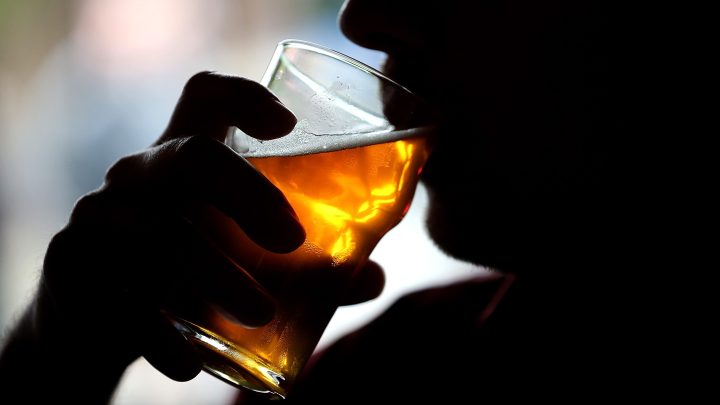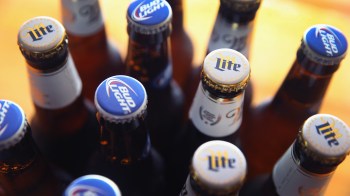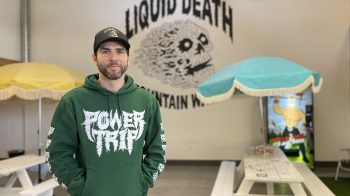
Beer? Pour me a grey one

With droughts occurring regularly across parts of the country, water supplies are becoming more precarious. One solution? Drinking purified wastewater. Some businesses are starting to use cleaned and filtered runoff from drains in products like beer.
“Marketplace” host Kai Ryssdal spoke with Chris Garrett, the founder and CEO of Devil’s Canyon Brewing Co. in San Carlos, California, about making beer using recycled grey water. The following is an edited transcript of their conversation.
Kai Ryssdal: Let’s get a little ground truth here about beer and water. Water is not everything. But it’s a lot when it comes to the kind of beer and the taste of beer that you want to make.
Chris Garrett: It’s critical. Just looking at alcohol by volume in a beer and it can be about 6%. Guess what the rest of it is? Well, it’s water, right? In most breweries, it takes about 10 gallons to 1 gallon to produce beer.
Ryssdal: Wait, sorry. So it takes 10 gallons of water to make a gallon of beer?
Garrett: Yeah, that’s the average across the United States, which is pretty tough to swallow, right?
Ryssdal: Yeah. So tell me about this experiment that you ran with grey water. I guess the first question is the mental hurdle you had to get through to say, “Yeah, we’re gonna use grey water in our beer.”
Garrett: Yeah, I mean, that’s a pretty high bar to cross. But, you know, we’ve seen some pretty difficult times of drought here in California over the last few years. Last year, not so much, but previously, and I mean, if we can cut our usage and maybe reuse, we’re doing everybody a favor and ourselves. But when we were approached, I said, “Well, that just doesn’t sound very tasty.” But it turns out in testing, the water’s actually pretty much better than what we’re getting from our municipality. But a lot of times, we’re gonna balance out water anyway. We do filter water on site, not to the degree they do. Most breweries do filter, if not a majority actually, reverse osmosis. So there’s really nothing left in the water anyway. And so they’re adding mineral content back to achieve styles from all over the world. You know, if you’re going to try to replicate an English beer, you’re probably going to add a little bit more of one salt or mineral to achieve that same, you know, water chemistry and quality.
Ryssdal: OK, but why replicate an English beer? I’m a beer snob, but I guess that’s a whole different interview. So look, let me ask you this about the beer that you eventually do wind up making. First of all, we should say just because you’re not allowed to sell it in California because it comes from recycled, purified water. This was sort of an experiment for you.
Garrett: It really was, I mean, it was, can you do it? Can you scale it? But yeah, for now, it was like, “Let’s test it. Let’s see what people think about it. Let’s see if we can actually do it.” And it was very much of an unknown, and it worked out great.
Ryssdal: Well, define “great.” I mean, if you would, would you serve this? Look, I mean, take yourself out of the equation, your being the brewmeister, but would you serve this at a party?
Garrett: You know, absolutely. In fact, Aaron, who was principal at Epic Cleantec, the folks that provided the water, he actually served it at his wedding. I think it’s kind of have to get over that first yecchh. Yeah, it shouldn’t be there. I mean, it’s truly it is better-quality water than what we’re seeing in a lot of parts of the country. We chose the style of beer as Kolsch because it’s very sensitive. You know, it’s a very light color, light-flavored beer, has a unique use profile. So you would see any impurity, and that was why we chose that style of beer.
Ryssdal: So putting your money where your beer is, I guess, right? So now what? I mean, you proved you can do it. The rules don’t let you sell it. Are you going to get Gov. Newsom on the phone and say, “Look, Gavin, we need to do this”?
Garrett: I think it’s a lower tier than Gavin to start with. The folks at Epic Cleantec are doing that right now. They’re working on that regulation. Good news is when we were in drought, we had some of our [state] senators, Sen. [Scott] Wiener out of San Francisco and some others came together and started to create legislation and policy. So it’s on its way and hopefully soon. It’s looking pretty good.
There’s a lot happening in the world. Through it all, Marketplace is here for you.
You rely on Marketplace to break down the world’s events and tell you how it affects you in a fact-based, approachable way. We rely on your financial support to keep making that possible.
Your donation today powers the independent journalism that you rely on. For just $5/month, you can help sustain Marketplace so we can keep reporting on the things that matter to you.

















